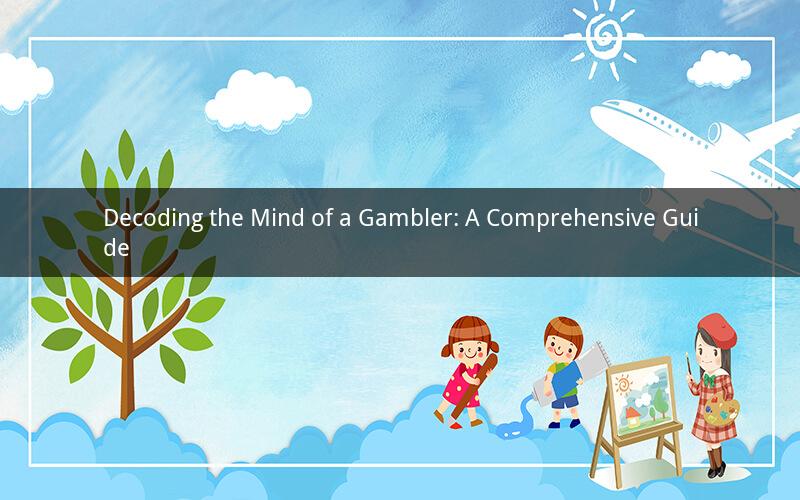
Introduction:
Understanding a gambler is not an easy task. Gamblers are often perceived as individuals driven by luck, chance, and a desire for excitement. However, there is much more to their world than meets the eye. This article aims to shed light on the complex mindset of a gambler, providing insights into their motivations, behaviors, and challenges. By understanding the factors that drive a gambler, we can gain a deeper appreciation for their struggles and offer support where needed.
1. The Psychology of Gambling:
Gambling is a form of entertainment that can be both thrilling and addictive. The psychological aspects of gambling are crucial in understanding a gambler's mindset. Here are some key psychological factors:
a. The thrill of uncertainty: Gamblers are often drawn to the excitement of uncertainty and the potential for winning big. The adrenaline rush associated with gambling can be highly addictive.
b. The illusion of control: Many gamblers believe they can influence the outcome of the game through their skills or strategies. This illusion of control can lead to increased risk-taking and problem gambling.
c. The reward system: The brain releases dopamine, a neurotransmitter associated with pleasure, when a gambler wins. This reward system reinforces the desire to continue gambling.
2. Types of Gamblers:
Understanding the different types of gamblers can help in tailoring support and interventions. Here are some common types:
a. Social gamblers: These individuals enjoy gambling as a social activity, but they are not necessarily addicted. They engage in gambling for entertainment purposes and can control their behavior.
b. Problem gamblers: Problem gamblers experience significant negative consequences due to their gambling habits. They may struggle with financial, emotional, and social problems as a result.
c. Pathological gamblers: Pathological gamblers exhibit severe gambling addiction, leading to significant distress and impairment in their lives.
3. Signs of Problem Gambling:
Identifying the signs of problem gambling is essential in providing appropriate support. Here are some common signs:
a. Preoccupation with gambling: Problem gamblers often think about gambling even when they are not engaging in it.
b. Loss of control: They may find it difficult to stop gambling, even when they want to.
c. Financial problems: Problem gamblers may experience financial difficulties due to their gambling habits, including debt and bankruptcy.
d. Emotional and social consequences: Problem gamblers may struggle with relationships, mental health issues, and other personal problems.
4. Support and Treatment:
Supporting a gambler is crucial in helping them overcome their challenges. Here are some strategies:
a. Encourage open communication: Create a safe and non-judgmental environment for the gambler to express their feelings and concerns.
b. Seek professional help: Encourage the gambler to seek help from a therapist or counselor specializing in gambling addiction.
c. Financial management: Assist the gambler in developing a budget and seeking financial counseling if necessary.
d. Support groups: Encourage the gambler to join support groups, such as Gamblers Anonymous, to connect with others facing similar challenges.
5. Coping with a Gambler:
Coping with a gambler can be challenging, but there are ways to manage the situation effectively:
a. Educate yourself: Learn about gambling addiction and its impact on individuals and families to better understand the situation.
b. Set boundaries: Establish clear boundaries and communicate your expectations regarding gambling behavior.
c. Seek support: Join support groups for family members of gamblers to connect with others experiencing similar challenges.
d. Practice self-care: Take care of your own mental and emotional well-being to better support the gambler.
Frequently Asked Questions:
1. Q: Can a person be a social gambler and not develop a gambling addiction?
A: Yes, a person can be a social gambler and not develop a gambling addiction. It depends on their ability to control their behavior and the impact it has on their life.
2. Q: How can I help a loved one who is struggling with problem gambling?
A: You can help by encouraging open communication, seeking professional help, providing financial support if needed, and joining support groups for family members of gamblers.
3. Q: Is it possible for a person to overcome a gambling addiction on their own?
A: While it is possible for some individuals to overcome a gambling addiction on their own, seeking professional help and joining support groups can significantly increase the chances of recovery.
4. Q: Can gambling addiction be hereditary?
A: There is evidence to suggest that a genetic predisposition may play a role in gambling addiction. However, environmental factors and personal choices also contribute to the development of addiction.
5. Q: How can I support a loved one who has stopped gambling but is still experiencing emotional and social consequences?
A: Continue to provide emotional support and encourage them to seek therapy or join support groups. Help them develop healthy coping mechanisms and support their efforts to rebuild their life.